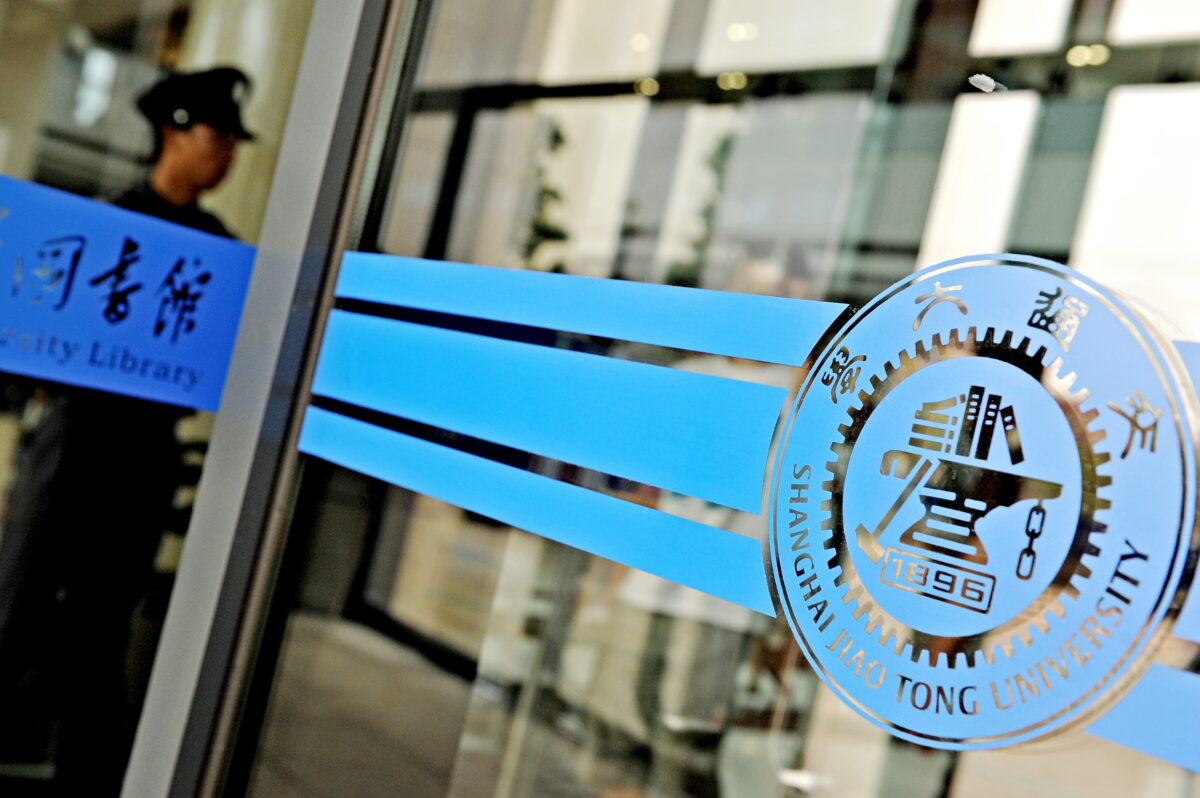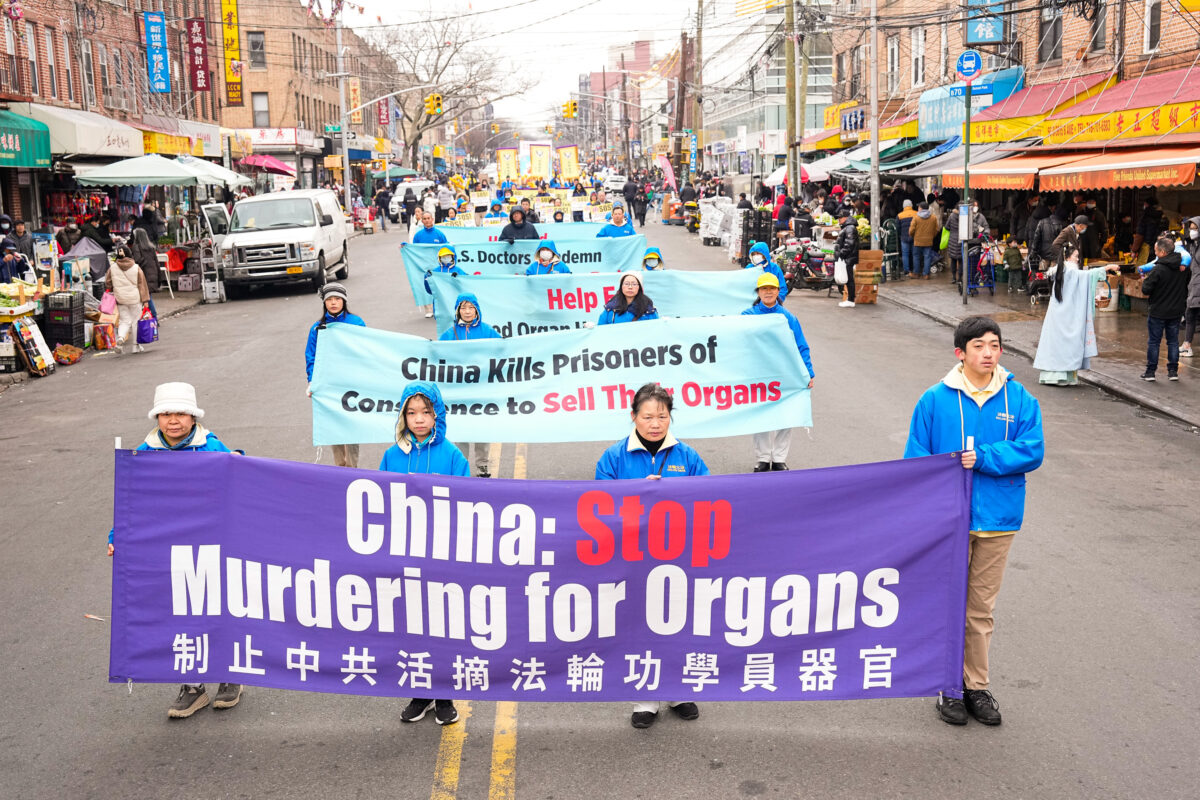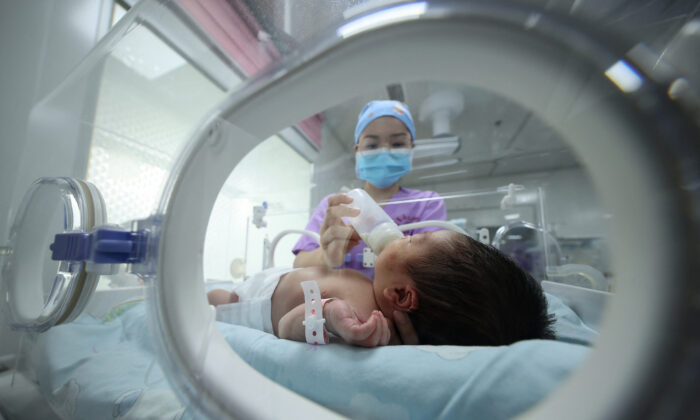Kidney Removal From Chinese Infants Rings Alarm on CCP’s Organ ‘Production Machine,’Expert Warns
In a recent international academic journal, Chinese doctors at Renji Hospital of Shanghai Jiao Tong University reported two cases of transplantation using kidneys from infants for adult patients with end-stage renal failure. Two infants had their kidneys removed—one day and three days after birth—respectively.
Given it would take weeks to months for an infant’s kidney to be matched for transplant, doctors may be targeting babies before they are even born by using the amniotic fluid for tissue typing, medical experts said, fearing that the Communist authorities may select Chinese infants before birth as an organ production machine.
Doctors at Renji Hospital, an affiliated hospital of state-funded Shanghai Jiao Tong University, published in the American Journal of Transplantation in Jan, reporting two ‘successful’ en bloc kidney transplantations (EBKT)—both kidneys—from preterm infants weighing less than 1.2 kg (2.6 pounds) to adult recipients.
The medical paper said that both of the infants’ parents had agreed to the withdrawal of life-sustaining therapy (WLST) and kidney organ donation after circulatory death (DCD) on the second or third day of the baby’s birth. Thus, one, fifteen minutes; another, twenty-five minutes after withdrawing life support measures, the mechanical heartbeat stopped, and the doctor pronounced the baby dead.
Subsequently, within three or five days of the two newborns’ birth, their small organs were removed, testing for donor-recipient compatibility was completed, and two adult recipients received a dual kidney transplant.
According to public information from the New York Presbyterian Hospital, the maximum preservation time for a removed kidney would be 24-48 hours.

Infant’s Organs Before Birth
In Western countries, recipients of neonatal kidney transplants are usually very young infants, but one of the recipients was 34 years old, according to the paper from Shanghai Renji Hospital. The other was 25, said Zain Khalpey, associate professor of Surgery, Medical Imaging, Physiological Sciences, and Biomedical Engineering at the University of Arizona.
“It is untested, unethical. If it’s going into another child, sure. If it’s going into an adult, I’m questioning it. So the practice of using a newborn baby is difficult to accept because they don’t have a say,” Khalpey told The Epoch Times on March 4.
Khalpey questions whether doctors at Shanghai’s Renji Hospital can complete matching tests within 3-5 days of the baby’s birth. He said it can be assumed that testing was carried out using amniotic fluid extracted while the baby was still in the mother’s womb. It can take weeks to crossmatch a donor after blood and tissue typing and find a compatible recipient.
“You know the length of time it takes to complete these steps depends on a variety of factors, including the availability of the organ, but clearly the complexity of the testing and the urgency. The situation is important. So, in general, the process of matching a neonatal kidney for transplant can take several weeks to several months,” Khalpey said.
Information on Barnes-Jewish Hospital’s website shows that organ donor evaluations, including donor matching, need one to six months to be completed. UCLA (University of California, Los Angeles) Health said it would take six months or longer to complete the donation process, depending on the test results, plus possible additional evaluations.
“So it seems extremely odd that this was done. It does seem, and it seems ‘manufactured,’” said Khalpey, referring to a pre-designed transplantation in advance that a short life or an organ can be “manufactured.”
Renji Hospital has “successfully” performed 22 neonate kidney transplants, according to a Feb. 27 news release on the Shanghai Jiao Tong University website.
Technical Bottlenecks and Ethical Concerns
The first kidney transplant in human history occurred in 1954. It was done by Dr. Joseph Murray of Brigham and Women’s Hospital, an affiliate of Harvard Medical School, where Khalpey was trained in cardiac surgery.
In 1963, Dr. Murray performed the first neonatal transplant. A baby received a kidney transplant from its identical twin but died of an infection after two and a half years.
“Since then, neonatal kidney transplant has become a routine procedure for infants, babies, with kidney failure. And the success rate of neonatal kidney transplants is high, with one-year graft survivals over 90 percent reported in some studies.
“However, the use of neonatal kidneys for adult transplant is rare” in the West regarding technical and ethical issues, said Khalpey.
He pointed out that one technical challenge is potential clinical mismatches between donor and recipient, saying, “neonatal kidneys are smaller than the adults, and the size mismatch can lead to complications such as thrombosis or stenosis and kidney vein blockages. In addition, the neonatal kidneys are less developed than the adult kidneys, which can lead to differences in function and then [the patient could] be susceptible to injury.”
Another difficulty is that infants can be born with congenital abnormalities.
“Congenital abnormalities are common in neonates, and some of these abnormalities can affect the function of the donated kidney. So, for example, a donated kidney with a congenital abnormality may be more prone to infection or may have a reduced filtering capacity. So using the kidneys for adult transplantation may therefore lead to higher risks of complications.”
In addition, there are ethical issues associated with the transplantation of organs from infants to adults, according to Khalpey.
“I mean, the neonates are vulnerable. And the use of their organs for transplant raises concerns about informed consent coercion. And the appropriate use of medical resources, and you know, in some cases, parents may feel pressured to donate their infant’s organs, particularly if they’re told that the donation will save the life of an adult. And the pressure may be exacerbated if patients are from disadvantaged backgrounds or lack access to health care. You know the use of neonatal kidneys for adult transplants therefore disproportionately affects certain populations, raising concerns about equity and justice.”
Another major ethical issue, Khalpey said, is “the commercialization of neonatal kidney transplants and the use of neonatal kidneys for adult transplant may be seen as a way to increase the supply of organs for transplant in countries with long wait lists for a transplant, and this may lead to the commodification of neonatal organs and exploitation.”
Other ethical concerns are the informed consent of organ-removed neonates’ parents or guardians, who are not understanding the implications of donation, and the abuse of medical resources, such as trafficking in the organs of deceased neonates, Khalpey added.

Why Target Infant Organs?
Despite these technical and ethical problems, Shanghai’s Renji Hospital is touting its growing number of newborn donors to provide organs for adult transplants.
In Khalpey’s analysis, this may be due to an “advantage” of infant organs.
If an infant’s kidney is transplanted, it may last a very long time in the recipient because newborn kidneys have few antibodies that can attack the recipient tissues (that is, cause graft versus host disease), “which is why the attraction of [Renji Hospital] doing it when they’re neonates.” Khalpey said.
Khalpey researched transplant accommodation and mismatch at Harvard Medical School and co-authored a relevant paper with Jeffrey L. Platt, professor of transplant surgery at the University of Michigan.
Khalpey was shocked by the American Journal of Transplantation’s acceptance of the Shanghai Renji Hospital article. He believes the magazine’s editors should have asked the authors four questions: Did the baby’s parents have knowledge and consent? Were the parents conscientious objectors [or members of] a vulnerable group? Was there a congenital abnormality in the transplanted kidney?
The most important question is: Did the doctors know of the existence of the 22 patients and complete the crossmatch at least a month before the transplants were performed? If they have done 22 infant kidney transplants and their article only mentions two, what happened to the other 20? Why does the paper only talk about two cases?
The first authors of the above neonatal transplant finding are Li Dawei and Wu Haoyu, attending physicians in the Department of Urology at Renji Hospital. The co-authors are Zhang Ming, deputy director of the Department of Urology at the same hospital, and Bei Fei, director of the Department of Neonatology at Shanghai Children’s Medical Center.

CCP Breaches Organ Transplants and Harvesting
The Chinese Communist Party [CCP] has long been accused of violating international transplant industry regulations.
In April 2022, the American Journal of Transplantation published a “computational text analysis to conduct a forensic review of 2,838 papers drawn from a dataset of 124,770 Chinese-language transplant publications. Our algorithm searched for evidence of problematic declarations of brain death during organ procurement. We find evidence in 71 of these reports, spread nationwide, that brain death could not have properly been declared.”
According to the U.S. Congress’ Tom Lantos Human Rights Commission, “the analysis … supports the inference that transplant surgeons in the People’s Republic of China (PRC) removed organs, including hearts and lungs, in violation of the internationally-accepted ‘dead donor’ rule, i.e., before donors have been (or could be) declared ‘brain dead.’”
The CCP has been widely accused of forced organ harvesting. Since 2015, Chinese Communist authorities have claimed that organs are obtained only from voluntary donors, but the integrity of this claim is questionable. Data shows that Chinese hospitals are performing several times more transplants than the highest estimates of organ donors could support.
In March 2020, an independent court issued its final verdict on the forced organ harvesting of prisoners of conscience by the CCP. On June 14, 2021, 12 United Nations officers said they were “extremely alarmed” by reports of organ harvesting of Falun Gong adherents, Uyghurs, Tibetans, and other ethnic minorities and Christians detained in China. They called on the Chinese communist government to “allow independent monitoring by international human rights mechanisms.”


No comments:
Post a Comment
Comments always welcome!